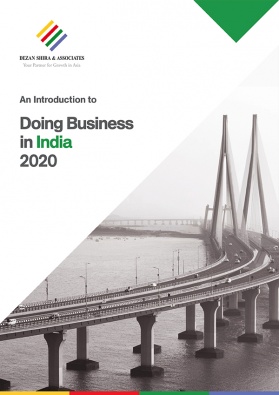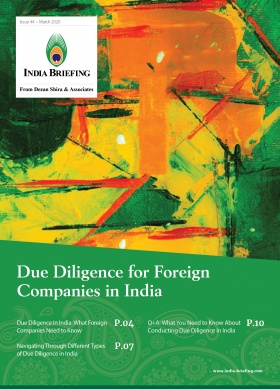Tamil Nadu’s Incentives for Electronics Manufacturing in India
The state of Tamil Nadu continues to boost its business environment for manufacturing investors. It unveiled an electronics manufacturing policy in September and announced its decision to set up an advanced manufacturing hub in partnership with the World Economic Forum, the first of its kind in South Asia.
On September 7, Tamil Nadu released the Tamil Nadu Electronics Manufacturing Policy 2020, which seeks to facilitate foreign investment in electronic systems design and manufacturing (ESDM) and promote the growth of homegrown startup enterprises.
Through the manufacturing policy, Tamil Nadu wants to raise its manufacturing output to US$100 billion by 2025 and account for 25 percent of India’s total electronics exports. This would also entail the skilling of more than 100,000 people by 2024.
An environment conducive to research and development and innovation will be created to boost ESDM startups, both in the component and original equipment or product manufacturing subsectors. High-tech solutions in design and manufacturing will be incentivized.
All incentives offered by the Tamil Nadu government to ESDM units will be in addition to the incentives offered by the central government to those units.
Investments made from January 1, 2020 will be considered eligible for availing incentives. The Tamil Nadu government will handhold ESDM companies during the setting up phase and after through its agencies.
The government may in its discretion, approve higher incentives/concessions and relax the conditions mentioned in the policy for deserving projects giving due weightage to investment, employment, value addition, and potential for attracting further investment through vendors and ancillaries.
Tamil Nadu has also been identified as a strategic location for advanced manufacturing in South Asia.
In this article, we discuss the state’s latest policy incentives for electronics manufacturers as well as its emergence as a base for advanced manufacturing.
What’s in the electronics manufacturing policy?
Focus sectors
The Tamil Nadu Electronics Manufacturing Policy seeks to enhance value addition in key focus sectors, including mobile phones, LED products, chip design, printed circuit boards (PCBs), solar photovoltaic cells, medical electronics, and automotive electronics.
Tamil Nadu’s policy will be dovetailed with the National Policy of Electronics 2019 – wherein the state government will support capacity building and investment in key sub-sectors.
Special support will be provided for developing core competencies in the following sub-sectors:
- Semiconductor fabrication (FAB)
- Assembly, test, marking, and packaging (ATMP)
- Fabless chip design
- Medical electronics
- Automotive, aerospace and aviation electronics
- Power electronics for mobility
- Telecom/ communication equipment
- Consumer electronics and appliances
- Strategic electronics
- Renewable energy electronics
- Electronic manufacturing services (EMS)
- Electronic components manufacturing
- Electronics test and calibration labs
- Electronics product design and intellectual property (IP) registration
Tamil Nadu aims to attract at least two major FAB investments into the state in the next three years. A FAB unit is a semiconductor fabrication plant where devices, such as integrated circuits (IC) chips are manufactured.
District classification in the state for incentive distribution
Category A: Chennai, Tiruvallur, Kancheepuram, and Chengalpet.
Category B: Coimbatore, Cuddalore, Erode, Karur, Krishnagiri, Namakkal, Ranipet, Salem, Tiruchirapalli, Tirupattur, Tiruppur, The Nilgiris, and Vellore.
Category C: Dharmapuri, Madurai, Theni, Dindigul, Sivagangai, Ramanathapuram, Virudhunagar, Tirunelveli, Thoothukudi, Kanniyakumari, Pudukottai, Ariyalur, Perambulur, Tenkasi, Thanjavur, Thiruvarur, Kallakurichi, Viluppuram, Mayiladuthurai, Nagapattinam, and Tiruvannamalai.
Location-based incentives
For core investments, the policy has identified districts in three categories. For investments worth INR 2 billion (US$27.19 million) to INR 5 billion (US$67.99 million), capital subsidy in category A district will be 15 percent, in category B district 20 percent, and in C category district 25 percent. For investments over INR 5 billion (US$67.99 million), capital subsidy in A district will be 18 percent, B district 24 percent, and in C district 30 percent. (US$1=INR 73.53).
Investors may note that Tamil Nadu has the following special economic zones (SEZs) under the Electronics Corporation of Tamil Nadu Ltd. (ELCOT): Chennai SEZ, Coimbatore SEZ, Madurai SEZ 1 and SEZ 2, Tiruchy SEZ, Tirunelveli SEZ, Salem SEZ, and Hosur SEZ.
Single window portals for ease of doing business
The single window facilitation for large and mega industries shall be done by Guidance (https://investingintamilnadu.com/) through its single window portal (https://www.easybusiness.tn.gov.in/).
The single window facilitation for MSME sector shall be done by the Commissioner of Industries and Commerce and District Industries Center (https://easybusiness.tn.gov.in/msme/).
Support for startups
The policy directs the state government to set up a Mega Electropreneur Center (MEC) in the form of a Centre of Excellence for Hardware, Products, and Ventures (CoE) to facilitate easy access and build a robust ecosystem for startups and entrepreneurs. This CoE will include a fully self-contained facility to support end-to-end design, development, testing, and certification of innovative hardware products.
The state will promote the development and acquisition of intellectual property in the ESDM sector, support well-functioning ATAL Tinkering Labs for the procurement of new electronic equipment, establish a cloud server to connect all the incubation centers across the state and make it available to all startups at low or nominal costs.
Promotion of research and development
To promote ESDM research and development, the Tamil Nadu government hopes to enter into twin city agreements with electronics manufacturing cities in countries, such as Japan, Vietnam, South Korea, Taiwan, Israel, and Singapore through its investment promotion agency.
Such agreements will promote collaboration through exchange of experience and information, cooperation plans, industry-specific programs and projects, establishment of joint expert groups, implementation of skill development programs, and regular expert-level consultations.
Financial incentives for MSMEs
The state government will formulate a special package of incentives for ESDM units in the MSME sector. This will include capital subsidy, interest subvention, low tension power tariff subsidy, generator subsidy, assistance for obtaining intellectual property and assistance in obtaining certifications. MSMEs will also be assisted to scale up their business to serve as vendor base for large and mega investors in this sector.
Financial incentives for large and mega categories
“Large” means a manufacturing project, new or expansion, with the investment range of INR 2 billion (US$27.19 million) to INR 5 billion (US$67.99 million) and the employment range of above 500 employees.
“Mega” means a manufacturing project, new or expansion, with investment above INR 5 billion (US$67.99 million) and the employment of above 2,000 employees.
The Tamil Nadu government will provide capital subsidy based on investment ranges and location for new or expansion of manufacturing units in the state. The capital subsidy will be back ended and based on investment in eligible fixed assets (EFA).
For eligible projects in ELCOT /SIPCOT/ SIDCO or any other state-owned industrial parks in C districts, land allotment will be made at 50 percent subsidized rate for land up to 20 percent of EFA. For private land in C category districts, 50 percent subsidy will be offered on cost of land as per guideline value up to an extent of 50 acres and subject to land cost not exceeding 20 percent of EFA and a cap of INR 20 million (US$271,997). The land cost will be excluded from the EFA calculation if this subsidy is availed.
Other incentives include location category-based stamp duty exemptions, training subsidies, interest subvention on actual term loans (given against corporate guarantee), power tax exemption, subsidy for intellectual capital and enhanced quality certification, and environment protection infrastructure subsidy for dedicated effluent treatment plants (ETP) and/or hazardous waste treatment storage and disposal facilities (HWTSDF) set up by individual manufacturing units.
Financial incentives for modified electronics manufacturing clusters
Electronics manufacturing clusters shall be established in accordance with the national Modified Electronics Manufacturing Clusters (EMC 2.0) scheme issued by the central government dated April 1, 2020. Apart from the assistance provided under the EMC 2.0 scheme, the Tamil Nadu government will extend the following additional incentives to the project implementation agency:
- Subsidy on land lease cost;
- Stamp duty exemption;
- Interest subsidy; and
- Facilitation through the Single Window Portal of Guidance.
Developing private ESDM parks
Under the policy, the state government will encourage developing private ESDM parks with common infrastructure, amenities, and waste handling facilities. Developers can apply for the incentives prior to commencement of the park, which must be sanctioned by the state government through the Inter-Departmental Committee (IDC).
The financial incentives shall be reimbursed to the developer subject to occupancy of the park by ESDM units to a minimum extent of 75 percent of allottable area, no later than four years from date of sanction of the package by IDC:
- Reimbursement of subsidy on land lease cost;
- Reimbursement of stamp duty exemption;
- Reimbursement of interest subsidy; and
- Facilitation through the Single Window Portal of Guidance.
India’s first advanced manufactured hub in partnership with the World Economic Forum
On October 7, the Tamil Nadu state government’s investment promotion agency, Guidance, formalized its partnership with the World Economic Forum (WEF) to establish an advanced manufacturing hub (AMHUB).
The AMHUB platform will “adopt IoT and other emerging technologies for advanced manufacturing to sustain and create new avenues of manufacturing growth” to harness opportunities in electronics, electric mobility, solar energy, and textiles. The goal is to “boost end-to-end manufacturing of high-tech and high-value products”.
Guidance is Tamil Nadu’s nodal investment promotion agency; it has statutory authority and facilitates single window clearances for businesses. AMHUB will the first such advanced manufacturing hub in South Asia and India.
Tamil Nadu as a location to support advanced manufacturing speaks to its improving business environment in recent years. This has been illustrated best by its flagship automobile sector. Backing this up is a recent revelation from South Korean carmaker Hyundai that its plant in Tamil Nadu (located in the capital, Chennai) was its second largest production base by output in 2019 after its home base in South Korea (in Ulsan). The India plant has an installed capacity of 696,000 units and produced 682,000 units in 2019 – producing almost four cars in three minutes. In comparison, Hyundai’s China plant (in Beijing) has an installed capacity of 1,350,000 units and produced 658,000 cars in 2019 – about 50 percent of its capacity. As per the company, Hyundai’s Irungattukottai plant in Chennai manufactures nine of its car models across all segments – Santro, Grand i10, Grand i10 Nios, Elite i20, Aura, Xcent, Verna, Elantra, Venue, Creta, Tucson, and Kona Electric. The Chennai plant is also Hyundai’s largest export base.
This article was originally published on September 11, 2020 and updated October 8, 2020.
About Us
India Briefing is produced by Dezan Shira & Associates. The firm assists foreign investors throughout Asia from offices across the world, including in Delhi and Mumbai. Readers may write to india@dezshira.com for business support in India.
- Previous Article Indian Railways Improves Freight Tracking via Newly Developed Portal
- Next Article Delhi will sein Gaststättengewerbe deregulieren, Betriebe sollen 24×7 geöffnet bleiben







